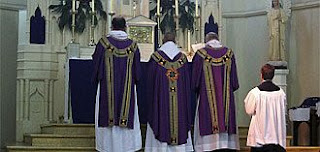The New Liturgical Movement has republished one of their articles from past years about the Pre-Lent season and its origins which can be read at NLM Reprint: Some Notes on the Origins and Character of Pre-Lent (Septuagesima, Sexagesima, Quinquagesima).
Not only is this an ancient part of the Church's liturgy and something that liturgy shares with the Byzantine tradition - I have Orthodox friends who progress into Lent giving up various foodstuffs along the way Sunday by Sunday - so it can be seen to have an ecumenical as well as a diachronic function.
There are other online articles about the season here and,from the Catholic Encyclopedia, here.
Not only is this an ancient part of the Church's liturgy and something that liturgy shares with the Byzantine tradition - I have Orthodox friends who progress into Lent giving up various foodstuffs along the way Sunday by Sunday - so it can be seen to have an ecumenical as well as a diachronic function.
There are other online articles about the season here and,from the Catholic Encyclopedia, here.

Mass for Septuagesima in Switzerland 2007
Image:roamincatholicphiladelphia.blogspot
In this photograph the deacon and sub-deacon are wearing dalmatic and tunicle rather than the folded chasubles usual in when violet vestments were worn until the 1950s and still by some churches today. There is a well illustrated article from the St Lawrence Press blogsite which explores their origins and development and gives several modern examples of their continuing use and which can be read here.
Whilst the abruptness of the change on Ash Wednesday has a real impact on our lives the traditional idea appears to be that in the gesimas we acknowledge that we have sinned and need to do something about it. In Lent we get on and actually do do something about that fact - fasting, acts of charity, spiritual preparation, confession, penance and the like to be ready for Easter.


No comments:
Post a Comment